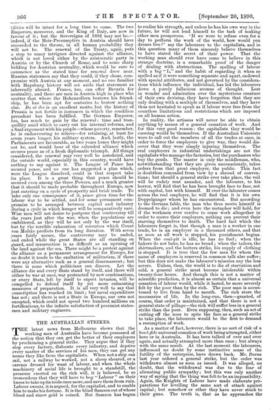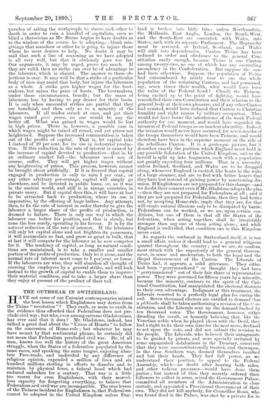THE AUSTRALIAN STRIKES.
latest news from Melbourne shows that the IP-working men of Australia have become possessed of the notion that they can get the better of their employers by proclaiming a general strike. They argue that if they stop every factory, dislocate every industry, and deprive every master of the services of his men, they can get any terms they like from the capitalists. When not a ship can sail, not a railway be worked, not a sheep sheared, or a carcass dressed for want of labour, and when the whole machinery of social life is brought to a standstill, the pressure exerted on the rich will, it is believed, be so tremendous that they will have to beg " Labour " on their knees to takeupits tools once more, and save them from ruin. Labour sweats, it is argued, for the capitalist, and to enable him to make his fortune. It is the blind Samson out of whose blood and sinew gold is coined. But Samson has begun latest news from Melbourne shows that the IP-working men of Australia have become possessed of the notion that they can get the better of their employers by proclaiming a general strike. They argue that if they stop every factory, dislocate every industry, and deprive every master of the services of his men, they can get any terms they like from the capitalists. When not a ship can sail, not a railway be worked, not a sheep sheared, or a carcass dressed for want of labour, and when the whole machinery of social life is brought to a standstill, the pressure exerted on the rich will, it is believed, be so tremendous that they will have to beg " Labour " on their knees to takeupits tools once more, and save them from ruin. Labour sweats, it is argued, for the capitalist, and to enable him to make his fortune. It is the blind Samson out of whose blood and sinew gold is coined. But Samson has begun to realise his strength, and unless he has his own way in the future, he will not lend himself to the task of making other men prosperous. If we were to refuse even for a day to perform the work of the world, how would you drones live ?' say the labourers to the capitalists, and in this question many of them sincerely believe themselves to have stated the secret of their power. That the working man should ever have come to believe in this strange doctrine, is a remarkable proof of the danger of dealing with abstractions. The spelling of labour with a big "L," and the habit of regarding it when so spelled as if it were something separate and apart, endowed with special attributes, and not governed by the considera- tions which influence the individual, has led the labourers down a purely fallacious avenue of thought. Lost in wonder and admiration over the mysterious creature of their own devising, they have forgotten that they are only dealing with a multiple of themselves, and they have thus not hesitated to speak as if labour were free from the countless limitations and restrictions which are imposed on all human action.
In reality, the artisans will never be able to obtain anything by means of a general cessation of work. And for this very good reason : the capitalists they would be coercing would be themselves. If the Australian Unionists were to call out the members of all the trades at once, in order to force the employers to give way, they would dis- cover that they were simply injuring themselves. The real employers in industrial undertakings are not the capitalists who manage the factories, but the purchasers who buy the goods. The master is only the middleman, who, notwithstanding that they are given unconsciously, takes orders from that great employer, the public. This fact is doubtless concealed from view by a shroud of conven- tions; but should a general strike ever take place, the veil will be rudely rent asunder, and the labourer, to his horror, will find that he has been brought face to face, not with capital, but with himself. If ever the labourer comes across the real employer, he will find that it is his own Doppelganger whom he has encountered. But according to the German fable, the man who thus meets himself is doomed to die ; and even here the metaphor will hold, for if the workmen ever resolve to cease work altogether in order to coerce their employers, nothing can prevent their starving themselves to death. The hard fact which the labourers forget is, that though a man is a worker in one trade, he is an employer in a thousand others, and that as soon as all work is stopped, his punishment begins. When the coal-pit is idle, he has no fuel ; when the bakers do not bake, he has no bread ; when the tailors, the shirtmakers, and the hatters strike, his supply of clothing is stopped. It is true that the few men for whom the name of employers is reserved in common talk also suffer; but this does not make the labourer's miseries any the less severe. Unless, then, the world is to die of starvation and cold, a general strike must become intolerable within twenty-four hours. And though this is not a matter of scientific prediction, it is almost as certain that a universal cessation of labour would, while it lasted, be more severely felt by the poor than by the rich. The poor man is accus- tomed to live from hand to mouth. The rich store the necessaries of life. In the long-run, then—granted, of course, that order is maintained, and that there is not a general state of pillage—the rich will suffer less in a general strike than the poor. Even supposing, then, such an act of cutting off the nose to spite the face as a. general strike to take place, the labourers would be the first to demand a resumption of work.
As a matter of fact, however, there is no sort of risk of a bond-fide universal cessation of work being attempted, either here or in Australia. It has been talked of over and over again, and actually attempted more than once ; but always with the same result. At the last moment the labourers, influenced no doubt by some instinctive sense of the futility of the enterprise, have drawn back. Mr. Burns last year ordered a general strike, but the order was withdrawn almost as soon as issued. It was alleged, no doubt, that the withdrawal was due to the fear of alienating public sympathy; but this was only another way of saying that the thing was felt to be an impossibility. Again, the Knights of Labour have made elaborate pre- parations for levelling the same sort of attack against capital; but somehow or other they have never stuck to their guns. The truth is, that as he approaches the paradox of asking the workpeople to starve each other to death in order to ruin a handful of capitalists, even so blind a rhetorician as Mr. Burns begins to have doubts as to the wisdom of the course he is adopting,—blank mis- givings that somehow or other he is going to injure those whom he most desires to help. No doubt it may be said that such a line of reasoning as we have adopted is all very well, but that it obviously goes too far. Our arguments, it may be urged, prove too much. If they are valid, then no strike can ever be of advantage to the labourer, which is absurd. The answer to these ob- jections is easy. It may well be that a strike of a particular body of men may assist that body, but injure the labourers as a whole. A strike gets higher wages for the boot- makers, but raises the price of boots. The bootmakers, under these circumstances, benefit ; but the mass of labourers lose by having to pay dearer for their boots. It is only when successful strikes are partial that they are beneficial, and then only so to a minority of the labourers. If all trades struck at once, and got their wages raised pan i passu, no one would be any the better off. What was gained in wages would be lost in high prices. There is, however, a possible case in which wages might be raised all round, and yet prices not heightened. Suppose the increased remuneration is taken out of the profits of capital. That is, let capital take 1 instead of 20 per cent. for its use in industrial produc- tion. If this reduction in the rate of interest is caused by the increase of capital devoted to production—that is, by an ordinary market fall—the labourers need not, of course, suffer. They will get higher wages without any heightening of prices. This process, however, cannot be brought about artificially. If it is decreed that capital engaged in production is only to earn 1 per cent., or any other arbitrary per-centage, capital will simply go elsewhere, and be invested in public loans, or, as it was in the ancient world, and still is in savage countries, in private usury. But if capital does this, it will have at last to be attracted back to production, where its use is imperative, by the offering of huge bribes. Any attempt, then, to fix the rate of interest in order thereby to give the labourer a larger share of the profits of production, is doomed to failure. There is only one way in which the labourer can better his position, and this is slowly, but none the less surely, operating in his favour. It is by the natural reduction of the rate of interest. If the labourers will only let capital alone and not frighten its possessors, it will accumulate so fast, and grow so great in bulk, that at last it will compete for the labourer as he now competes for it. The tendency of capital, as long as natural condi- tions are maintained, is to take a smaller and smaller portion of the profits of production. Only let it alone, and the normal rate of interest must come to 1 percent. or lower. If the labourers are wise, they will abandon all thought of coercing the employers by a general strike, and will look instead to the growth of capital to enable them to improve their material condition, and to take a larger share than they enjoy at present of the product of their toil.



































 Previous page
Previous page